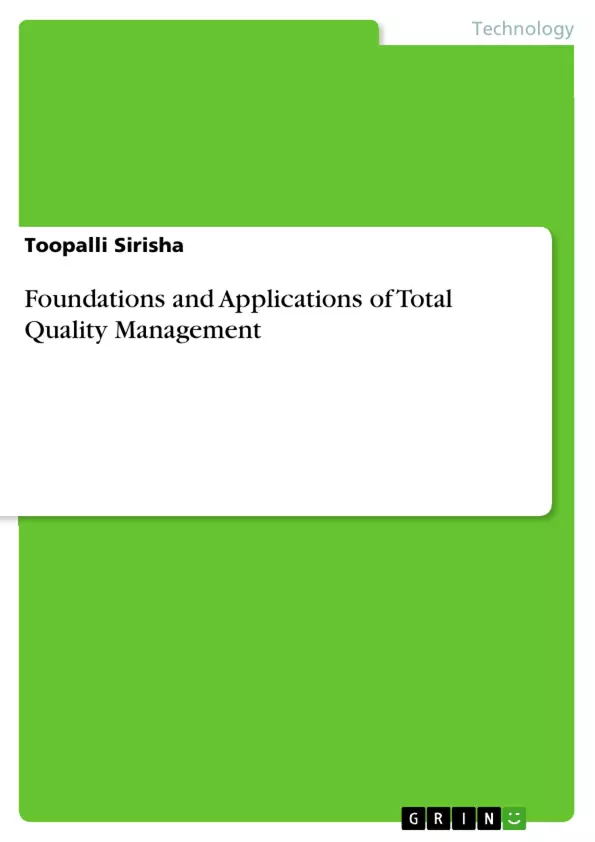In today's fiercely competitive global marketplace, ensuring quality has become a cornerstone of success for organizations across industries. Total Quality Management (TQM) stands at the forefront of this quality revolution, offering a comprehensive framework to achieve excellence in products, services, and processes. This book delves deep into the principles, practices, and tools of Total Quality Management, providing a comprehensive guide for both students and professionals seeking to understand and implement TQM effectively in their organizations. Designed to align with the syllabus requirements outlined above, this book offers a structured approach to exploring the multifaceted facets of TQM.
Sets the stage by discussing fundamental concepts of quality, tracing its evolution, and elucidating dimensions of quality in both products and services. It further introduces basic tenets of TQM and highlights contributions of luminaries such as Deming, Juran, and Crosby, while also addressing barriers organizations may encounter on their TQM journey. Delves into core principles of TQM, emphasizing pivotal role of leadership, employee involvement, continuous process improvement, and supplier partnerships. Through discussions on quality statements, strategic planning, and employee motivation, this section offers practical insights into fostering a quality culture within organizations. Explores myriad of tools and techniques integral to TQM framework. From traditional quality tools to modern methodologies like Six Sigma and Quality Function Deployment (QFD), readers will gain comprehensive understanding of how to identify, analyze, and improve processes to achieve superior quality outcomes. Finally, it introduces readers to Quality Management Systems (QMS), focusing on ISO 9000 series and Environmental Management Systems (EMS) under ISO 14000 standards. By elucidating benefits and requirements of ISO registration and implementation, this section equips readers with knowledge needed to navigate certification process successfully. Throughout this book, practical examples, case studies, and real-world applications illustrate key concepts and demonstrate the transformative potential of TQM. Whether you are student embarking on your academic journey or seasoned professional seeking to enhance organizational performance, this book aims to serve as comprehensive resource on Total Quality Management.
Inhaltsverzeichnis (Table of Contents)
- An Overview of Total Quality Management
- TQM Principles
- TQM tools and techniques I
- TQM tools and techniques II
- Quality Management System
Zielsetzung und Themenschwerpunkte (Objectives and Key Themes)
This book aims to provide a comprehensive understanding of Total Quality Management (TQM) principles, practices, and tools. It equips readers with practical insights and proficiency in implementing TQM to drive organizational excellence. The text also prepares individuals for certification processes related to TQM and Quality Management Systems (QMS), fostering continuous improvement and enhanced performance.
- The foundational principles of Total Quality Management
- Practical tools and techniques for implementing TQM
- The role of leadership, employee involvement, and continuous improvement in TQM
- Quality Management Systems (QMS) and ISO standards
- The benefits of adopting TQM for organizational success
Zusammenfassung der Kapitel (Chapter Summaries)
- An Overview of Total Quality Management: This chapter introduces the basic concepts of TQM, outlining its framework, evolution, and key elements. It explores quality cost, customer focus, and customer satisfaction as essential components of a successful TQM approach.
- TQM Principles: This chapter delves into the core principles of TQM, emphasizing the importance of leadership, employee involvement, continuous process improvement, and supplier partnerships. It provides practical insights into fostering a culture of quality within organizations.
- TQM tools and techniques I: This chapter explores various tools and techniques integral to the TQM framework, including traditional quality tools, Six Sigma, and Quality Function Deployment (QFD). Readers will gain an understanding of how to identify, analyze, and improve processes to achieve superior quality outcomes.
- TQM tools and techniques II: This chapter continues the exploration of TQM tools, focusing on Quality Circles, Cost of Quality, Taguchi quality loss function, and Total Productive Maintenance (TPM). It provides practical applications and insights into measuring and managing quality effectively.
Schlüsselwörter (Keywords)
Total Quality Management (TQM), Quality Management System (QMS), ISO 9000 Series, Environmental Management System (EMS), ISO 14000, Six Sigma, Quality Function Deployment (QFD), Customer Satisfaction, Continuous Improvement, Employee Involvement, Supplier Partnerships, Leadership.
- Citar trabajo
- Dr. Toopalli Sirisha (Autor), 2024, Foundations and Applications of Total Quality Management, Múnich, GRIN Verlag, https://www.grin.com/document/1453681



